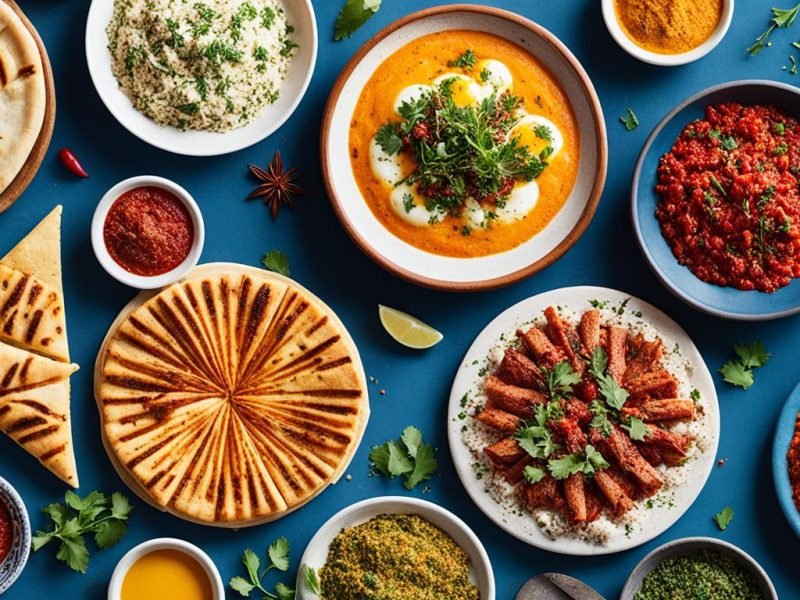I was in a lively café in Tunis, ready for a culinary journey. I was looking forward to trying delicious lamb, spicy harissa, and various tastes from the sea and land. This is what makes Tunisian cuisine so exciting. But, I had a question that many travellers have: Can You Eat Pork In Tunisia? This question is interesting because of Tunisia’s dietary rules and the strong respect for religious food laws.
As I explored Tunisia’s narrow alleys and vibrant souks, it wasn’t just about seeing the sights. It was about experiencing a rich cultural heritage. Every meal tells a story of history and belief in this sun-kissed country. The Islamic tradition plays a crucial role, especially when it comes to food. Learning about Tunisia’s food is like a journey into its traditions and history.
Key Takeaways
- Pork is not widely consumed in Tunisia due to Islamic dietary laws.
- Diverse Tunisian cuisine offers rich gastronomic experiences beyond pork.
- Understanding the local dietary restrictions is essential for travellers.
- Religious laws significantly influence the availability of certain foods in Tunisia.
- Exploring traditional food is a way to connect with Tunisia’s cultural heritage.
- Pork may be available in certain areas catering to international tourists or non-Muslim residents.
Understanding Tunisian Dietary Restrictions and Religious Laws
Tunisian food customs are deeply influenced by the country’s religious beliefs. I’m intrigued by how Islamic dietary laws are part of Tunisian life. This affects personal choices and the overall food culture. In Muslim countries like Tunisia, eating pork is not common.
The Role of Islamic Dietary Laws in Tunisia
Islam shapes many parts of Tunisian life, especially food. The Qur’an bans pork, defining Tunisia’s culinary identity. This adherence to Halal is both a tradition and an expression of faith.
Influence of Religious Practices on Tunisian Cuisine
Travelling through Tunisia, I’ve seen how religion shapes food choices. Because of the Tunisia pork ban, dishes feature lamb, beef, and chicken. Spices, grains, and legumes add flavour. This diet blends into daily meals and special occasions.
Permissibility of Pork in the Context of Tunisian Traditions
So, is pork eaten in Tunisia? My findings show it’s legally allowed but rarely found due to Islamic laws. Non-Muslims might look for pork, but it’s hard to find. This scarcity shows the respect for religious guidelines and how they influence food choices.
| Main Protein Sources in Tunisian Cuisine | Common Ingredients | Presence in Local Dishes |
|---|---|---|
| Lamb and Beef | Spices, Herbs, Olive Oil | Extensive |
| Poultry | Grains, Vegetables | Widespread |
| Seafood | Legumes, Citrus | Common in Coastal Areas |
| Pork | — | Limited to Specific Zones |
To sum up, religious beliefs and culture create Tunisia’s unique food. The diet is rich and varied, without pork. This shows that food restrictions can lead to innovation in cooking.
Diversity in Tunisian Cuisine: Beyond Couscous and Seafood
Tunisian cuisine is more than just couscous and seafood. It blends Mediterranean flavours with traditional practices. This mix appears in a variety of dishes, showing the skill and creativity of Tunisian cooks. They have mastered many dishes without using pork dishes in Tunisia.
Join me on a journey to explore Tunisian cuisine. This cuisine is remarkable, even without pork. You will find delicious lamb and poultry, marinated and cooked perfectly with herbs and spices. These dishes are aromatic and very satisfying.
Vegetables take centre stage in many meals, used in stews and as fillings in brik. Grains and legumes are essential, making meals hearty and healthy. Nuts and dried fruits add a special touch, while herbs create the unique Tunisian flavour.
I have experienced the depth of Tunisian food. It’s the quality of the ingredients that makes the cuisine stand out. Despite the absence of pork, Tunisian food is rich and inviting. It is a reflection of the country’s rich culture and history.
“The diversity of Tunisian cuisine stands as a proud reflection of the country’s storied past and its ability to adapt and evolve, painting every plate with the colours of history, culture, and passionate cooking.”
Can You Eat Pork In Tunisia?
In Tunisia, eating pork is rare. This is because Tunisian food history and Islamic rules don’t mix with pork. The country’s past with European foods has made pork a complicated topic. This article looks into pork’s place in Tunisia’s culture, history, and today.
Historical and Cultural Perspectives on Pork Consumption
Tunisia’s culture mixes many influences, including Ottoman, French, and Italian. But, Islam’s strong presence keeps pork off the menu. Tunisia’s food history shows us that tradition beats trying new things, especially pork.
Availability of Pork Dishes in Tunisia Amidst Culinary Restrictions
Finding pork in Tunisia is not easy. It’s mostly found in places meant for tourists or expats. Sometimes, in cities or places where tourists go, you might find pork. But, these are rare cases, showing pork is not a popular choice for locals.
Contemporary Attitudes Towards Eating Pork among Tunisians
Today, how Tunisians see eating pork varies. Young people might be more open, but many stick to ‘halal’ foods. For most, eating ‘halal’ is not just tradition, it’s part of daily life and values.

| Age Group | Views on Pork Consumption | Percentage (%) |
|---|---|---|
| 18-25 | Moderately permissive | 25 |
| 26-35 | Mostly conservative | 40 |
| 36-45 | Conservative | 55 |
| 46+ | Highly conservative | 70 |
To understand pork eating in Tunisia, know the culture and religion’s impact. This mix creates a unique food scene. It’s a reflection of Tunisia’s diverse and rich history.
Harissa and Hearty Meals: Exploring Tunisia’s Spicy Culinary Heritage
I love exploring the bright flavours of North Africa. Tunisia’s spicy culinary heritage stands out. At its heart is Harissa. This chili paste brings a unique heat to Tunisian food. With its vivid red colour from smoked chillis, Harissa does more than spice up a dish; it’s a treasured part of the culture.
Harissa shows Tunisians’ passion for spicy food. A typical Harissa mix might have smoked chilli peppers, garlic, caraway seeds, and coriander. A bit of olive oil is also added. It’s key in many local dishes, from a simple Harissa sandwich to flavourful stews and soups.
Tunisia loves bold flavours, not just Harissa. Spices like cumin and caraway are always found in their kitchens. These spices make every meal special. They add a surprising depth that’s both amazing and comforting.
Here’s a table showing traditional Tunisian dishes where Harissa and other spices are important:
| Tunisian Dish | Main Spices Used | Typical Ingredients |
|---|---|---|
| Lamb Tagine | Harissa, Cumin, Coriander | Lamb, potatoes, carrots, onions |
| Shakshuka | Harissa, Garlic, Paprika | Eggs, tomatoes, peppers, onions |
| Couscous | Caraway, Coriander, Cumin | Couscous, vegetables, chickpeas, meat (optional) |
| Brik | Harissa (for dipping) | Tuna, egg, capers, filo pastry |
I really admire Tunisia’s love for spicy food. Harissa, the nation’s jewel, is more than a side. It’s a strong symbol of a culture that loves deep and warm flavours. Each bite of Tunisian cuisine is a journey. It tells tales of trade, fertile land, and chefs’ skill in blending simple things with bold tastes.
French and Italian Influences on Tunisian Gastronomy
The rich tapestry of Tunisian gastronomy combines local traditions with European influence on Tunisian cuisine. The French colonial influence and Italian culinary impact have brought new flavours. Yet, they haven’t overshadowed Tunisia’s own culinary identity. This blend creates a culinary mix that reflects Tunisia’s diverse heritage.
The Legacy of Colonial Cuisine in Tunisia
I have seen how French and Italian foods have impacted Tunisia. Baguettes and pastas join Tunisian dishes like couscous. This mix of cuisines forms a delightful culinary bridge. It shows a seamless blend of Tunisian dishes and European flavours, creating a unique food heritage.
Adoption of European Ingredients and Techniques in Tunisian Dishes
In Tunisia, European ingredients and methods are everywhere. Tunisian chefs skillfully mix these into their dishes, keeping the cuisine authentic. Visiting a local market or talking to a Tunisian cook demonstrates how items like olive oil, pasta, and potatoes have become essentials in Tunisian cooking.
| European Ingredient | Role in Tunisian Cuisine |
|---|---|
| Olive Oil | A foundational element for cooking and dressings |
| Pasta | Widely used in dishes such as Pasta with Harissa |
| Potatoes | Commonly featured in stews and as sides |
During my travels in Tunisia, I’ve savoured its genuine gastronomy. It’s full of history and culinary borrowings from various cultures. This blend of tastes, including French and Italian influences, remains true to its roots. It offers a glimpse into the nation’s character.
The Vibrant Flavours of Tunisia: Tabil, Tajine, and Traditional Spices
Delving into Tunisian cookery reveals the importance of Tabil and Tunisian Tajine. These, along with a wealth of traditional Tunisian spices, bring each dish to life. Tabil blends garlic, cayenne, caraway seeds, and coriander into a harmonious mix. This blend is the heart of many recipes. Meanwhile, the Tunisian Tajine stands out. It’s not a stew or pie but a baked egg and meat dish, enriched with these spices.

The array of Tunisian spices goes even further. They include the delicate flavour of rose petals and the fiery kick of harissa. These tastes are part of a rich culinary legacy.
The custom of savouring snails, a tradition entrenched in the annals of regional diets since prehistoric times, offers just a peek into the depths to which Tunisian cuisine reaches.
To really understand these spices, here’s a breakdown of some traditional ones and how they’re used:
| Spice | Description | Common Uses |
|---|---|---|
| Tabil | A potent mix dominant in garlic, cayenne, caraway, and coriander. | Key in soups, stews, and meat seasonings. |
| Ras el Hanout | Over a dozen spices combine for a layered taste. | Ideal for couscous and rice seasoning. |
| Harissa | A bold chilli paste, balanced with garlic and spices. | Adds a kick to stews and acts as a condiment. |
| Mint | A fresh herb offering a cool balance to heat. | Found in teas, salads, and over grilled dishes. |
It might be the blend of spices in Tabil and Tunisian Tajine that captivates. Or the historical trade that introduced these flavours to Tunisia. Either way, it’s a culinary world filled with vibrant tastes and traditions.
Tourism and Culinary Experiences: Tunisia’s Hospitality and Food Culture
Tunisia offers a rich blend of flavours, each telling a unique story. With every bite of Tunisian street food, you experience tradition and friendship. Exploring crowded markets and quiet coastal towns, it’s clear. Culinary tourism in Tunisia is more than food. It’s about cultural exchange.
Savouring Tunisia’s Gastronomic Delights: From Street Food to Gourmet
In Tunisia, from Tunis medina to Sidi Bou Said, culinary adventures await. This journey engages all your senses. Each dish, whether a crisp brik or a lavish couscous royal, tells of the land and its people’s pride.
The Role of Culinary Tourism in Preserving Tunisian Cuisine Traditions
Preserving traditions is key in interactive culinary experiences. Cooking classes share more than recipes. They connect the past with today. Every tour or class helps keep Tunisian culinary heritage alive. It brings ancient flavors into today’s kitchens.
| Experience | What You’ll Discover | Impact on Culinary Tradition |
|---|---|---|
| Street Food Tours | Freshly made brik, aromatic spice markets, local sweets. | Supports small vendors and traditional recipes. |
| Gourmet Dining | Contemporary twists on classic dishes, high-quality local produce. | Encourages chefs to sustain and experiment with traditional recipes. |
| Cooking Classes | Hands-on preparation of Tunisian staples, family recipes. | Passes on culinary skills and stories to a global audience. |
A Guide to Eating Out in Tunisia: Navigating Local Eateries and Cuisine
When I began exploring Tunisia’s diverse culinary scene, I was thrilled by the flavours in local eateries. This guide is more than a list of places. It’s a deep dive into Tunisia’s food culture and its welcoming spirit. From a lively souk stall to a calm café by the sea, every meal unveils the Tunisian cuisine’s depth.
Tunisian dining customs and service expectations can really enhance your dining experience. You’ll often be welcomed with a warm smile and a mint tea. Remember, tipping for good service is valued here.
Eating out in Tunisia is like going on a flavour adventure. You’ll find spicy merguez sausages in the north and lamb dishes with dates in the south. Here are some eateries and food spots to try:
- Street Vendors – Perfect for trying local snacks like ‘brik’ and ‘makroudh’.
- Beachside Shacks – They serve the freshest Mediterranean seafood.
- Traditional Restaurants – Dive into the heart of Tunisian cuisine with dishes like couscous and tagine.
- International Eateries – Ideal when craving something familiar while overseas.
Asking locals for recommendations helped me find Tunisia’s culinary hidden gems. From intimate bistros to scenic hilltop restaurants, each place was unique.
Here’s a look at different eatery types you’ll find in Tunisia:
| Eatery Type | Ambience | Specialties |
|---|---|---|
| Cafes | Relaxed, casual | Light meals, coffee, pastries |
| Bistros | Casual, sometimes themed | Diverse menus, from Tunisian to European cuisine |
| Street Food Stalls | Lively, open-air | Snacks, sandwiches, fried delights |
| Seafood Restaurants | From casual to fancy | Grilled fish, seafood platters, Med-style meals |
To sum up, Tunisia has an exciting variety of eateries waiting to be discovered. Whether you want a quick street food bite or a fancy meal, Tunisian eateries offer freshness, taste, and hospitality. Exploring local cuisine is a must-do for anyone visiting.
Organic Farming and Sea Harvest: The Fresh Ingredients of Tunisian Cooking
The lush Tunisian countryside and the shimmering Mediterranean waters provide an array of organic foods. In Tunisia, choosing organic ingredients is more than a trend; it’s a long-held tradition. The soil produces vibrant tomatoes and sweet melons, capturing the warmth of the Tunisian sun. The sea harvest, on the other hand, offers a variety of seafood, as refreshing as the ocean breeze. These impeccable, locally sourced Tunisian produce define the unique flavours of Tunisian cooking.
From Land and Sea: The Source of Tunisia’s Culinary Bounty
The uniqueness of Tunisian dishes isn’t just about the ingredients. It’s also about how they are grown and gathered. Through organic farming, each vegetable, grain, and fruit is a symbol of sustainable and ethical farming. Similarly, the fishing practices in the Mediterranean honor the sea’s life cycles. This ensures the rich Tunisian cooking tradition can be enjoyed by future generations.
Integration of Locally Sourced Produce in Traditional Cooking
The essence of traditional Tunisian cooking lies in the blend of flavours from fresh, local ingredients. Spices enhance the natural sweetness of farm produce and the salty sea taste. This harmony of seasonal, locally sourced produce shapes Tunisia’s culinary story. It enhances flavours and fosters a collective appreciation for the land and sea that nourish this culture.
| Ingredient | Source | Use in Tunisian Cooking |
|---|---|---|
| Olives | Organic Farms | Salads, Pastes, Cooking Oil |
| Sea Bream | Sea Harvest | Grilled, Baked with Spices |
| Dates | Oasis Groves | Desserts, Chutneys, Stuffed Snacks |
| Tomatoes | Vegetable Plots | Sauces, Soups, Fresh Salads |
Conclusion
In my search to answer Can You Eat Pork In Tunisia?, I’ve learned the nation’s food is much more than just one dish. Tunisia’s mix of Mediterranean and North African roots, along with Islamic dietary laws, creates a bold variety of tastes and textures. This shows the country’s rich food culture.
When you try Tunisian culinary journey, you won’t miss pork because of the many other local dishes. Each meal shows Tunisia’s warm welcome and dedication to food. The spicy Harissa and the hearty Tajine share stories of culture, religious respect, and love for fresh, local produce.
The beauty of exploring Tunisian food culture is seeing how chefs blend different traditions yet keep the food truly Tunisian. Ending my trip, I find wondering about pork is small compared to Tunisia’s wider food wonders. Eating in Tunisia is diving into a rich, sensory experience that goes beyond any diet limits.







